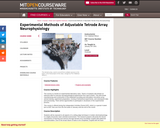
Experimental Methods of Adjustable Tetrode Array Neurophysiology
- Subject:
- Psychology
- Social Science
- Material Type:
- Full Course
- Provider:
- M.I.T.
- Provider Set:
- M.I.T. OpenCourseWare
- Author:
- Wilson, Matthew
- Date Added:
- 01/01/2001

Experimental Methods of Adjustable Tetrode Array Neurophysiology
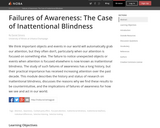
We think important objects and events in our world will automatically grab our attention, but they often don’t, particularly when our attention is focused on something else. The failure to notice unexpected objects or events when attention is focused elsewhere is now known as inattentional blindness. The study of such failures of awareness has a long history, but their practical importance has received increasing attention over the past decade. This module describes the history and status of research on inattentional blindness, discusses the reasons why we find these results to be counterintuitive, and the implications of failures of awareness for how we see and act in our world.
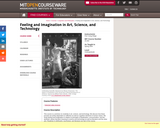
Seminar on the creativity in art, science, and technology. Discussion of how these pursuits are jointly dependent on affective as well as cognitive elements in human nature. Feeling and imagination studied in relation to principles of idealization, consummation, and the aesthetic values that give meaning to science and technology as well as literature and the other arts. Readings in philosophy, psychology, and literature.

Explore how your own mind works, and discover how the limitations of the human brain can lead to major miscarriages of justice.
Despite advances in forensic science, eyewitness testimony remains a critical component of criminal investigations. Psychological research has revealed the dangers of relying on evidence gained from an eyewitness and also how careful the police need to be when questioning witnesses (Source: OpenLearn, The Open University's website).

This free course, Forensic science and fingerprints, covers how science can make fingerprints easier to study, how they are used in court and some of the questions about the extent to which fingerprint identification is sound and scientific. Students will learn the principles used in classifying and matching fingerprints (often called marks). (Source: OpenLearn, the Open University website).
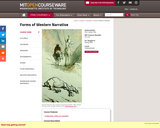
Major narrative texts from diverse Western cultures, beginning with Homer and concluding with at least one film. Emphasis on literary and cultural issues: on the artistic significance of the chosen texts and on their identity as anthropological artifacts whose conventions and assumptions are rooted in particular times, places, and technologies. Syllabus varies, but always includes a sampling of popular culture (folk tales, ballads) as well as some landmark narratives such as the Iliad or the Odyssey, Don Quixote, Anna Karenina, Ulysses, and a classic film. This class will investigate the ways in which the formal aspects of Western storytelling in various media have shaped both fantasies and perceptions, making certain understandings of experience possible through the selection, arrangement, and processing of narrative material. Surveying the field chronologically across the major narrative genres and sub-genres from Homeric epic through the novel and across media to include live performance, film, and video games, we will be examining the ways in which new ideologies and psychological insights become available through the development of various narrative techniques and new technologies. Emphasis will be placed on the generic conventions of story-telling as well as on literary and cultural issues, the role of media and modes of transmission, the artistic significance of the chosen texts and their identity as anthropological artifacts whose conventions and assumptions are rooted in particular times, places, and technologies. Authors will include: Homer, Sophocles, Herodotus, Christian evangelists, Marie de France, Cervantes, La Clos, Poe, Lang, Cocteau, Disney-Pixar, and Maxis-Electronic Arts, with theoretical readings in Propp, Bakhtin, Girard, Freud, and Marx.

In this book, we want to bring to life the core concepts at the heart of addiction. You may have friends or family members struggling with an addiction, or you yourself may have problems with addiction. You might be interested in working to help people in recovery, or you are simply curious to know more about this issue. Whatever the case, this book will introduce key terminology and research help you define, discuss, diagnose, and deal with this problem.
The material is organized so that each chapter focuses on a different theme related to addiction. Within each chapter are multiple sub-parts where you will find an introductory reading, a video, an article, an activity, questions for discussion, and a short quiz. Some sections also include slide presentations for you to view.
Chapter One: What is Addiction?
Chapter Two: Why Do People Use?
Chapter Three: An Overview of Pharmacology
Chapter Four: Special Considerations
Chapter Five: Adolescents and Addiction
Chapter Six: Addiction and the Family
Chapter Seven: Biopsychosocial Issues
Chapter Eight: Assessment & Treatment
Chapter Nine: Pathways to Recovery
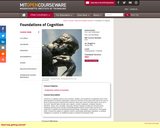
Advances in cognitive science have resolved, clarified, and sometimes complicated some of the great questions of Western philosophy: what is the structure of the world and how do we come to know it; does everyone represent the world the same way; what is the best way for us to act in the world. Specific topics include color, objects, number, categories, similarity, inductive inference, space, time, causality, reasoning, decision-making, morality and consciousness. Readings and discussion include a brief philosophical history of each topic and focus on advances in cognitive and developmental psychology, computation, neuroscience, and related fields. At least one subject in cognitive science, psychology, philosophy, linguistics, or artificial intelligence is required. An additional project is required for graduate credit.

" This team-taught multidisciplinary course provides information relevant to the conduct and interpretation of human brain mapping studies. It begins with in-depth coverage of the physics of image formation, mechanisms of image contrast, and the physiological basis for image signals. Parenchymal and cerebrovascular neuroanatomy and application of sophisticated structural analysis algorithms for segmentation and registration of functional data are discussed. Additional topics include: fMRI experimental design including block design, event related and exploratory data analysis methods, and building and applying statistical models for fMRI data; and human subject issues including informed consent, institutional review board requirements and safety in the high field environment. Additional Faculty Div Bolar Dr. Bradford Dickerson Dr. John Gabrieli Dr. Doug Greve Dr. Karl Helmer Dr. Dara Manoach Dr. Jason Mitchell Dr. Christopher Moore Dr. Vitaly Napadow Dr. Jon Polimeni Dr. Sonia Pujol Dr. Bruce Rosen Dr. Mert Sabuncu Dr. David Salat Dr. Robert Savoy Dr. David Somers Dr. A. Gregory Sorensen Dr. Christina Triantafyllou Dr. Wim Vanduffel Dr. Mark Vangel Dr. Lawrence Wald Dr. Susan Whitfield-Gabrieli Dr. Anastasia Yendiki "
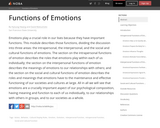
Emotions play a crucial role in our lives because they have important functions. This module describes those functions, dividing the discussion into three areas: the intrapersonal, the interpersonal, and the social and cultural functions of emotions. The section on the intrapersonal functions of emotion describes the roles that emotions play within each of us individually; the section on the interpersonal functions of emotion describes the meanings of emotions to our relationships with others; and the section on the social and cultural functions of emotion describes the roles and meanings that emotions have to the maintenance and effective functioning of our societies and cultures at large. All in all we will see that emotions are a crucially important aspect of our psychological composition, having meaning and function to each of us individually, to our relationships with others in groups, and to our societies as a whole.

Abnormal Psychology is an Open Education Resource written by Alexis Bridley, Ph.D. and Lee W. Daffin Jr., Ph.D. through Washington State University. The book tackles the difficult topic of mental disorders in 15 modules. This journey starts by discussing what abnormal behavior is by attempting to understand what normal behavior is. Models of abnormal psychology and clinical assessment, diagnosis, and treatment are then discussed. With these three modules completed, the authors next explore several classes of mental disorders in 5 blocks. Block 1 covers mood, trauma and stressor related, and dissociative disorders. Block 2 covers anxiety, somatic symptom, and obsessive-compulsive disorders. Block 3 covers eating and substance-related and addictive disorders. Block 4 tackles schizophrenia spectrum and personality disorders. Finally, Block 5 investigates neurocognitive disorders and then ends with a discussion of contemporary issues in psychopathology. Disorders are covered by discussing their clinical presentation and DSM Criteria, epidemiology, comorbidity, etiology, and treatment options.
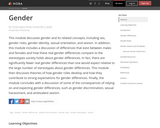
This module discusses gender and its related concepts, including sex, gender roles, gender identity, sexual orientation, and sexism. In addition, this module includes a discussion of differences that exist between males and females and how these real gender differences compare to the stereotypes society holds about gender differences. In fact, there are significantly fewer real gender differences than one would expect relative to the large number of stereotypes about gender differences. This module then discusses theories of how gender roles develop and how they contribute to strong expectations for gender differences. Finally, the module concludes with a discussion of some of the consequences of relying on and expecting gender differences, such as gender discrimination, sexual harassment, and ambivalent sexism.

This course will introduce the student to the psychology behind gender and sexuality. In this course, the student will take a look at how our understanding of one's own gender and sex can affect different aspects of our functioning, while also identifying the factors in our lives that can impact oneĺÎĺĺÎĺs gender and sex. This course will begin by introducing and defining the concepts of gender and sexuality, then looking at the similarities and differences between sexes in terms of biological and neurological functioning and development, as well as gender and sexual identity. Also, the student will discuss why and how the sexes are psychologically and cognitively different. Upon successful completion of this course, students will be able to: define and explain specific terms that relate to gender and sexuality; define and explain influences that impact homosexual and heterosexual gender identities; define and explain sexual stereotypes; explain the biologically based characteristics, including differences and similarities, between genders; explain the differences between gender identities, including theoretical approaches; explain the sociobiological and psychoanalytic approaches to sexuality and gender identity; define and explain the social learning and cognitive developmental approaches to gender and sexuality; explain the commonalities and differences between the cognitive abilities of genders; explain the commonalities and differences between gender and aggression. (Psychology 406)

The NOBA Project is a growing collection of expert-authored, open-licensed modules in psychology, funded by the Diener Education Fund. From these open modules, Tori Kearns and Deborah Lee created an arranged open textbook for her introductory psychology class. This textbook was created under a Round One ALG Textbook Transformation Grant.
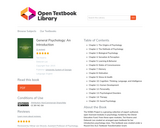
The NOBA Project is a growing collection of expert-authored, open-licensed modules in psychology, funded by the Diener Education Fund. From these open modules, Tori Kearns and Deborah Lee created an arranged open textbook for her introductory psychology class. This textbook was created under a Round One ALG Textbook Transformation Grant.
Table of Contents
Chapter 1: The Origins of Psychology
Chapter 2: The Methods of Psychology
Chapter 3: Biological Psychology
Chapter 4: Sensation & Perception
Chapter 5: Learning & Behavior
Chapter 6: States of Consciousness
Chapter 7: Memory
Chapter 8: Motivation
Chapter 9: Stress & Health
Chapter 10: Cognition: Thinking, Language, and Intelligence
Chapter 11: Human Development
Chapter 12: Personality
Chapter 13: Psychological Disorders
Chapter 14: Therapy
Chapter 15: Social Psychology

Emphasis will be placed upon application of psychological knowledge to daily situations, and upon accessing and assessing information from a variety of sources about behavior. Skills in scientific reasoning and critical thinking will be developed during this course. Areas of psychology to be included are: research methods, neuroscience, human development, perception, consciousness, learning, memory, intelligence, motivation, emotion, personality, psychological disorders, psychotherapy, stress and health, and social psychology.Login: guest_oclPassword: ocl

What are the most effective methods to study for a test? What are the meanings of dreams? How do illusions work? With whom are you most likely to fall in love? These are just a few of the questions that have been asked by psychologists since the birth of the field as an area of scientific research in the 1870’s. This text surveys the basic concepts, theories, and pivotal findings over the past 100 years in the science of Psychology, with special emphasis on contemporary concepts and findings focused on the relation of the brain to normal and pathological behaviors. Psychology has long evolved past the psychodynamic influence to include biological, social, learning, motivational, and developmental perspectives, to name a few. Contemporary psychologists go beyond philosophical or anecdotal speculation and rely on empirical evidence to inform their conclusions. Similarly, readers will push beyond pre-existing schemas and misconceptions of the field of psychology to an understanding of contemporary quantitative research methods as they are used to predict and test human behavior.
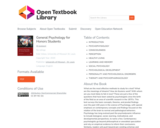
What are the most effective methods to study for a test? What are the meanings of dreams? How do illusions work? With whom are you most likely to fall in love? These are just a few of the questions that have been asked by psychologists since the birth of the field as an area of scientific research in the 1870’s. This text surveys the basic concepts, theories, and pivotal findings over the past 100 years in the science of Psychology, with special emphasis on contemporary concepts and findings focused on the relation of the brain to normal and pathological behaviors. Psychology has long evolved past the psychodynamic influence to include biological, social, learning, motivational, and developmental perspectives, to name a few. Contemporary psychologists go beyond philosophical or anecdotal speculation and rely on empirical evidence to inform their conclusions. Similarly, readers will push beyond pre-existing schemas and misconceptions of the field of psychology to an understanding of contemporary quantitative research methods as they are used to predict and test human behavior.
Table of Contents
INTRODUCTION
PSYCHOPHYSIOLOGY
CONSCIOUSNESS
PERCEPTION
HEALTHY LIVING
LEARNING AND MEMORY
SOCIAL PSYCHOLOGY
PSYCHOLOGICAL DEVELOPMENT
PERSONALITY AND PSYCHOLOGICAL DISORDERS
THERAPY AND PSYCHOPHARMACOLOGY
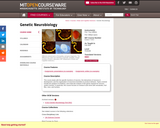
Deals with the specific functions of neurons, the interactions of neurons in development, and the organization of neuronal ensembles to produce behavior, by functional analysis of mutations and molecular analysis of their genes. Concentrates on work with nematodes, fruit flies, mice, and humans.
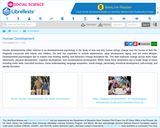
Human developmental (often referred to as developemental psychology is the study of how and why human beings change over the course of their life. Originally concerned with infants and children, the field has expanded to include adolescence, adult development, aging, and the entire lifespan. Developmental psychologists aim to explain how thinking, feeling, and behaviors change throughout life. This field examines change across three major dimensions: physical development, cognitive development, and socioemotional development. Within these three dimensions are a broad range of topics including motor skills, executive functions, moral understanding, language acquisition, social change, personality, emotional development, self-concept, and identity formation.
This includes the books Human Development Life Space and Lifespan Development - A Psychological Perspective